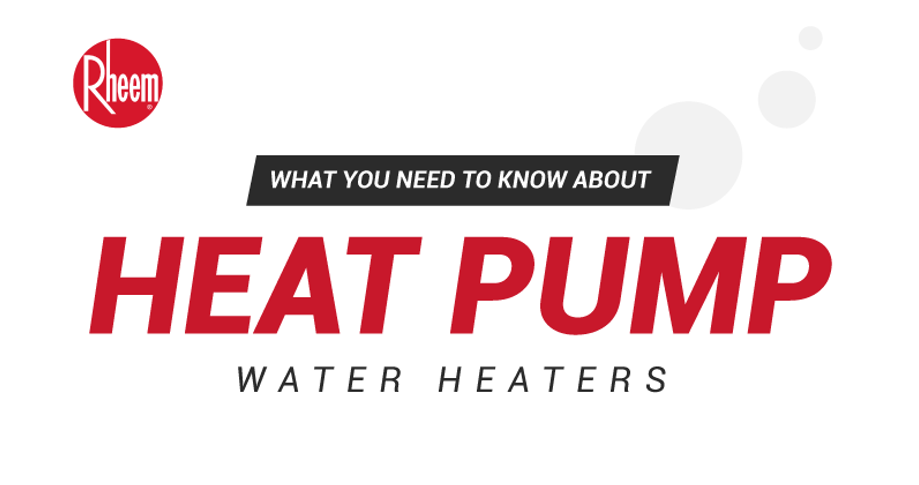
Heat pump water heaters are one of the most energy- and cost-efficient methods of heating water and are becoming the top choice for many households in recent years. Unlike a conventional hot water heater, a heat pump water heater utilizes energy to transport existing heat from one location to another instead of creating heat directly. Homeowners usually use heat pumps to warm and cool their houses, but they may also be used as a stand-alone water heater or as part of a system that provides both hot water and space conditioning.
A heat pump operates similarly to a refrigerator, but in reverse. A fan draws warm air from wherever the heat pump is placed and blows it over a series of refrigerant-filled evaporator coils. The refrigerant is pushed through a compressor to boost the pressure and temperature. It is then transferred through condenser coils wrapped around or passed inside a water tank. The heated refrigerant transfers its heat to the water, cools down, and then returns to the evaporator coils, collecting warm ambient air and continuing its cycle.
Heat pump water heaters in the Philippines must be built in areas where the temperature is at least 32° Celsius throughout the year. Otherwise, they will not perform effectively or at all. Heat pump water heaters are inefficient in cold environments because they tend to chill their surroundings. Installing them in a room with excessive heat will improve their performance.
Heat pump heaters have a greater initial investment than traditional storage water heaters. However, they have reduced running expenses, which might compensate for the higher purchase and installation prices.
One of the most important things to look for in a heat pump heater is its first-hour rating, which generally refers to the number of gallons a heater can supply in an hour. The water heating unit’s capacity should cater to the demand, especially during peak hours when the water heater is used for various activities.
Each heating unit comes with an energy factor that tells how many gallons of water the heater can produce per unit of power or fuel. This is important as a larger energy factor means the heater is more efficient, allowing you to save money on bills and be more environmental-friendly.
Heat pump water heaters come in different sizes, and it is vital that you get a unit that fits perfectly where you are planning to place it. Doing so can help prevent the need for costly remodeling work just for you to have a safe and secured spot in your basement or garage.
Installation and Maintenance
The energy efficiency of your heat pump heater can be maximized through proper installation and maintenance. Installation quality is contingent on a variety of factors. These elements include the kind of fuel, environment, local construction code restrictions, and safety concerns. A certified plumbing and heating contractor or geothermal heat pump system installer/designer should install your heat pump. In addition, regular water heater maintenance can also help increase its life and avoid efficiency loss.
Follow the steps below when choosing a competent professional:
The system is composed of nine primary components:
Advantages of Having Heat Pump Water Heaters
Heat Pump Water Heaters use ambient heat around the unit, which makes them substantially more efficient than storage or instant water heaters. They absorb and transmit the surrounding heat to the water rather than requiring energy, fuel, and a separate heating element to create new heat. In return, heat pump heaters can help you save hundreds of pesos in the long run.
Heat pump heating units use less electricity and natural gas, helping reduce greenhouse gas (GHG) emissions. This is important as decreasing the amount of GHG discharge is a priority for many companies and households, especially with many places already feeling the effects of global warming. Investing in heat pump heaters can ensure that you’re doing your part in protecting nature while still having a reliable supply of warm water for your property.
Heat pumps are more convenient to install and maintain than solar heaters, gas/oil-fired heaters, and boilers. Solar water heaters need regular roof cleaning to preserve the performance of solar collectors. Gas/oil-fired heaters and boilers use flammable fuel, necessitating skilled maintenance to ensure their safety and optimal performance.
In comparison, heat pump maintenance resembles air conditioner maintenance. Consequently, it is simpler to locate people who can maintain them. Also, they often have innovative electronic features allowing users to monitor the heater’s condition through their mobile phones.
Conclusion
As more Filipinos continue to discover the importance of warm water in various daily activities, numerous individuals will look to invest in quality heaters for their homes. Purchasing a heat pump heater is becoming popular because of its reliability in supplying heated water to various water points without adding a significant amount to the electric bill.
If you are already searching for the best heat pump heater brand in the market, why not choose Rheem Philippines? With almost 100 years in the water heating industry, Rheem has constantly focused on innovating and creating more advanced, high-quality water heating solutions to suit our customers’ unique needs. With Rheem, you can enjoy reliability, durability, and functionality.
Browse Rheem’s extensive range of heat pump water heaters and other water heater types that is ideal for any property in the Philippines. For any inquiries or more information about our products, you can also talk to one of our representatives by clicking here.

Subscribe

At Rheem, we strive to innovate
best-in-class products to lead the industry
in
environmental improvements.
Sustainability